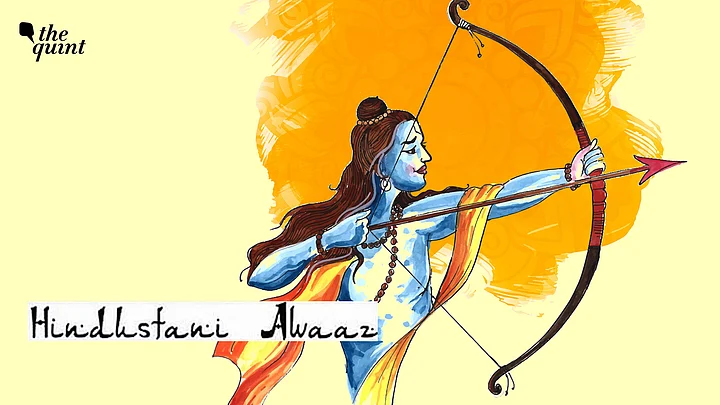Today, India that is Bharat will celebrate Ramanavami, the birth of Rama, the seventh avatar of Vishnu. The festival celebrates the descent of Vishnu as the Rama avatar, through his birth to King Dasharatha and Queen Kausalya in Ayodhya, the capital of Kosala. For centuries, this momentous occasion has been celebrated in verse and in spirit by the Urdu poet, the true upholder of a mili-juli tehzeeb. Here’s a description of the birth of Ram in Ayodhya Nagri in one of the many Urdu manzum (verse) Ramayanas:
Dhoom dhaam thii chaaron taraf duniya mein Kaushal desh ki
Jiska raqba thha bahut, thhi jiski aaabadi badi
Thhi Ayoydhya rajdhani jiski mashhoor-e-jahan
Karti thhi sairab jisko sarsabz sarju nadi
(The name and fame of the kingdom of Kaushal were spread all over the spread
Its territories were large, and its population big
Its capital, Ayodhya, was famous all over the world
It was watered and made fertile by the river Sarju
The fierce bow and arrow-wielding Ram of recent times has been described by Saaghar Nizami, thus:
Zindagi ki rooh thha roohaniyat ki shaan thha
Woh mujassam roop mein insaan ke irfan thha
(He was the spirit of life and pride of spirituality
In his entire human form, he was knowledge incarnate
And by Muhammad Iqbal as:
Talwar ka dhani tha shujaat mein fard tha
Pakeezgi mein josh-e-mohabbat mein fard tha
(An expert with the sword and exceptional in bravery
He was exceptional in purity and the ardour of love)
Urdu Poets Imagined Ram As No Separate From Rahim
There has been a propensity among the Urdu poets to conjoin Ram with Rahim as in this sher by Bashir Badr:
Hazaaron bhes mein phirte hain Ram aur Rahim
Koi zaruri nahin hai bhala bhala hii lage
(Ram and Rahim go about in a thousand guises
It is not necessary that the guise appears good.)
And as Sab Bilgrami says:
Qadam qadam pe Raavan hain
Lekin nirbal ke bas Ram bahut hain
(At every step, there is a Raavan
But for the defenceless Ram will suffice.)
Languages are known to mirror cultures and civilisations. The Urdu language is especially blessed because it has benefitted from a cross-fertilisation that few other Indian languages have had access to. Words and expressions not just from Hindi and Braj bhasha but a host of dialects have enriched it and added a distinct flavour.
The sheer number of words and expressions associated with Ram is simply one instance of its catholicity and liberality: Ramdana (amaranth), Ram-rajya (a period of tranquility), Ram bharose (relying on providence), Ram laddu (a streetside chaat), Ram chiddiya (kingfisher), Ram dhanush (rainbow) as well Ram-Ram, once a common greeting across religious lines.
And then there are the many delightful idiomatic ways in which Ram is invoked: Baghal mein chhuri, muh mein Ram-Ram (for those pretending to be religious but harbouring evil thoughts), Soojhe nahi Ram, chaand ki Ram-Ram (for those with limited intellect), Ram milaii jodii (a perfect match) and its more politically incorrect variation Ram milai jodi, eil andha eik kodhi (for a pair where both are equally wicked), Ba Musalmaan Allah-Allah, ba Brahman Ram-Ram (roughly translated to mean when in Rome do as Romans do), Ram-Ram japna, paraya maal apna (for outwardly religious people who usurp the property of others), Raja Bhim ki qaza Ram ki raza (there’s an ordained time for death), Samay-samay ke daata Ram (God is the provider), Ram ki maya, kahin dhoop kahin chhaya (referring to the unevenness in the world), Ram-Lakhan ki jodi (for an ideal pairing) among many more.
‘Ram Doesn’t Represent Religious Polarisation'
Those who pull out Muslims from trains or force hapless imams of masjids to chant ‘Jai Shri Ram’ would do well to remember this sher by Rahbar Jaunpuri: Aina-e-khuloos-o-Mohabbat yahan thhe Ram Aman aur shanti ki zamanat yahan thhe Ram (Ram was a mirror of love and affection, Ram was a surety of peace and security. Abdus Sattar Danish provides a much-needed perspective as to why a divisive movement was launched in the name of Shri Ram:
Masla sirf kursiyon ka thha Baat Babar se Ram tak pahunchi.
(The issue was simply one of chairs
From Babur, the talk ended with Ram.)
Perhaps, today is as good a day as any to ask if this love and veneration that has existed for centuries, that has been nurtured and nourished by visionary poets and a part of the lived reality for millions of peace-loving Indians, will be irrevocably lost in the none-too-distant future? Will Ram no longer be mine to love and admire for his humility and gentleness? Must I first render proof of my admiration by chanting ‘Jai Shri Ram’?
What is more, to live in peace must I be ready, at the insistence of a mob of lumpens to chant his name? To furnish proof of my Indianness to a vigilante mob? Is this what Maryada Purushottam Ram, the mard-e-kamil (‘the perfect man’), would want of his followers?
To end, here is Sahir Ludhianvi asking:
Jis Ram ke naam pe khoon bahey uss Ram ki izzat kya hogi
Jis deen ke haathon laaj lutey uss deen ki qeemat kya hogi
(That Ram in whose name blood is shed, what is his respect
That religion for which honour is robbed, what is its price.)
(Rakhshanda Jalil is a writer, translator and literary historian. She writes on literature, culture and society. She runs Hindustani Awaaz, an organisation devoted to the popularisation of Urdu literature. She tweets at @RakhshandaJalil. This is an opinion piece and the views expressed above are the author’s own. The Quint neither endorses nor is responsible for the same.)
(At The Quint, we question everything. Play an active role in shaping our journalism by becoming a member today.)
